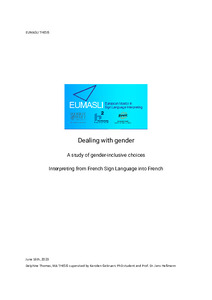Dealing with gender: a study of gender-inclusive choices interpreting from French Sign Language into French
Thomas, Delphine (2023)
Thomas, Delphine
2023
All rights reserved. This publication is copyrighted. You may download, display and print it for Your own personal use. Commercial use is prohibited.
Julkaisun pysyvä osoite on
https://urn.fi/URN:NBN:fi:amk-2023112932528
https://urn.fi/URN:NBN:fi:amk-2023112932528
Tiivistelmä
This thesis examines the use of gender-inclusive language in interpreting from French Sign Language (LSF) to French. While LSF seems to have only a few gender markers, the existing literature considers gender to be very present in the French language, and binary (Abbou, 2022). That gender paradigm does not conform with the understanding of gender as a spectrum that has been gaining momentum in France (Viennot, 2014). Furthermore, gender-inclusive language has been more and more used (Abbou, 2022, Viennot, 2014). This research utilises Lami’s categorisation of gender-inclusive strategies in French (2022) to evaluate the preferred strategies of four hearing interpreters during two interpreting tasks: one general, mainstream source text and one that has a feminist focus. Enhanced by semi-directed interviews and a think-aloud protocol (TAP), where participants comment on source texts identifying gender issues and explain their choices, this research explores this potentially feminist interpreting practice and its compatibility with the interpreter’s role. Data analysis suggests that the inclusiveness of LSF could encourage interpreters to prefer gender-neutral, collective terms or impersonal phrases in French, over word pairs or strategies that make women visible. Worried about negative reactions or overstepping their role, interpreters might also censor themselves and avoid the most visible forms of gender-inclusive language like neologisms. Findings indicate that interpreters navigate between feminist ideology and current language evolution, a shared agency with deaf people they embodied when working in that direction, and the perception of their role, including ethical values. Further research on the effects produced by different chosen strategies on hearing audience could yield knowledge on the general topic of gender-inclusive language. Specifically, when it concerns deaf communities, it could explore language interferences and how LSF can impact French discourse. Ce mémoire s’intéresse aux pratiques de langue inclusive dans l’interprétation de la Langue des signes française (LSF) vers le Français. En effet, la LSF semble peu recourir à des marques de genre alors que la littérature indique que le Français est une langue très genrée et binaire (Abbou, 2022), ce qui ne correspond pas à la vision se déployant actuellement en France du genre comme un spectre (Viennot, 2014). Cette recherche s’appuie sur la catégorisation des stratégies de langue inclusive de Lami (2022) pour explorer les stratégies privilégiées par 4 interprètes entendant‧es lors de deux tâches d’interprétation (textes sources standard et féministe). D’autre part, un protocole de pensée à voix haute post-tâche a permis aux participant‧es d’identifier des difficultés spécifiques liées au genre dans le texte source voire d’expliquer leurs choix. Également complété par des entretiens individuels, ce travail de recherche explore cette pratique d’interprétation potentiellement féministe et sa compatibilité avec le rôle de l’interprète. Les résultats suggèrent que la relative inclusivité de la LSF pourrait influencer les interprètes à privilégier les termes neutres (épicènes ou collectifs) ou le contournement par des tournures impersonnelles plutôt que la féminisation via les doublons de mots féminin et masculin. Craignant les réactions négatives des personnes entendantes présentes dans la situation et ne voulant pas outrepasser leur rôle vis-à-vis des personnes sourdes, les interprètes semblent également s’auto-censurer et éviter les formes les plus visibles de langue inclusive comme les néologismes. Les interprètes paraissent naviguer entre leur idéologie féministe, l’évolution actuelle de la langue, une agentivité partagée avec les personnes sourdes qui sont incarnées dans ce sens d’interprétation, et leur rôle et valeurs éthiques. Analyser les effets que produisent différentes stratégies sur des publics entendants permettraient d’approfondir la recherche sur la langue inclusive en général. Dans le cas de langues en contact, l’impact de la LSF sur la production en français est un aspect à explorer également, concernant les communautés sourdes.
Kokoelmat
Samankaltainen aineisto
Näytetään aineisto, joilla on samankaltaisia nimekkeitä, tekijöitä tai asiasanoja.
-
BITTE KLAR BILD GEBÄRDEN; systematic Promotion of Modality Specific Translation and Interpretation into German Sign Language in L2/M2
Ruf, Julia (2023)Empirical research in the field of Second Language Acquisition (SLA) of Signed Languages (SLs) is essential in order to inform and improve practices in teaching L2/M2 learners as well as training interpreters who work with ... -
Impact of Duolingo on YKI Test Preparation
Areb, Remedan (2024)This thesis explores the impact of Duolingo, a widely used online language learning platform, on the preparation for the YKI (Yleinen Kielitutkinto) exam among individuals with a foreign background seeking Finnish citizenship. ... -
Gamified Elements in Free to Use Chinese-English Language Learning Applications
Zheng, Congze (2022)Throughout human history, many educators have been looking for a way to improve learning initiative, and gamification in line with human nature has always had the potential to exist.The popularity of mobile de- vices and ...


